Overview
To effectively combat the challenge of a skinny pot belly, individuals must prioritize enhancing their dietary choices, elevating physical activity levels, and managing stress effectively.
It is crucial to recognize that addressing factors such as visceral fat accumulation through targeted nutrition and consistent exercise, alongside lifestyle modifications like stress management and improved sleep quality, can significantly enhance overall health.
These strategies not only contribute to reducing the protruding abdomen associated with this condition but also foster a more balanced and healthier lifestyle.
Introduction
In a world where health and body image are often oversimplified, the phenomenon of a 'skinny pot belly' presents a perplexing contradiction. Individuals may appear slim overall, yet struggle with a protruding abdomen, raising critical questions about the underlying health risks associated with visceral fat.
This article delves into the causes of this condition—from dietary choices and sedentary lifestyles to genetic factors—while emphasizing the urgent need for awareness regarding the dangers of excess visceral fat.
As the conversation around body composition evolves, understanding the implications of a skinny pot belly becomes essential for promoting long-term health. By exploring effective nutritional strategies, exercise regimens, and lifestyle modifications, individuals can take proactive steps towards achieving a healthier body and mitigating the risks associated with this condition.
Understanding the Skinny Pot Belly: Definition and Causes
An individual with a skinny pot belly may appear thin overall, yet they possess a distinctly protruding abdomen. This condition can stem from various factors, including inadequate muscle tone, an accumulation of visceral fat, or even temporary bloating. It is crucial to distinguish between subcutaneous fat, which lies just beneath the skin, and visceral fat, which encases internal organs and is associated with heightened health risks.
Current statistics indicate that the prevalence of visceral fat is an escalating concern, particularly regarding overall well-being. Research reveals that individuals with a skinny pot belly might remain unaware of the potential dangers linked to excess visceral fat, which has been correlated with conditions such as cardiovascular disease and diabetes. Indeed, recent studies underscore that visceral fat can be more detrimental than subcutaneous fat, highlighting the necessity for awareness and proactive wellness measures.
Expert opinions in 2025 assert that addressing the underlying causes of a skinny pot belly is vital for long-term health. Contributing factors to this condition encompass poor dietary choices, insufficient physical activity, and genetic predispositions. Medical professionals stress the importance of recognizing that even individuals who appear thin can harbor excess visceral fat, which can lead to serious implications for health.
As one expert noted, "It must be, I mean there’s more than one factor, obviously it’s partly visual, it’ll partly be down to what they actually weigh on the scales and partly whether you consider someone’s overweight I suppose depends on whether it impacts as well on their day to day life, whether it stops them from being active."
A notable case study from the Gateshead Millennium Study revealed that many parents significantly underestimated their children's weight status, with only 7.3% recognizing their child as overweight compared to 23.7% identified as such by the International Obesity Taskforce criteria. This emphasizes the essential need for enhanced awareness and education regarding body composition and the risks associated with visceral fat. Additionally, 80.3% of parents of overweight and obese children expressed concern about national childhood overweight, underscoring the significance of acknowledging risks related to body composition.
In summary, understanding the definition and causes of a skinny pot belly is essential for effectively addressing this condition. By concentrating on nutritious lifestyle choices and recognizing the dangers linked to visceral fat, individuals can take proactive measures toward enhancing their overall wellness and well-being. The ongoing conversation about body image and wellness emphasizes the need for a balanced perspective that prioritizes fitness and well-being over clinical weight status.
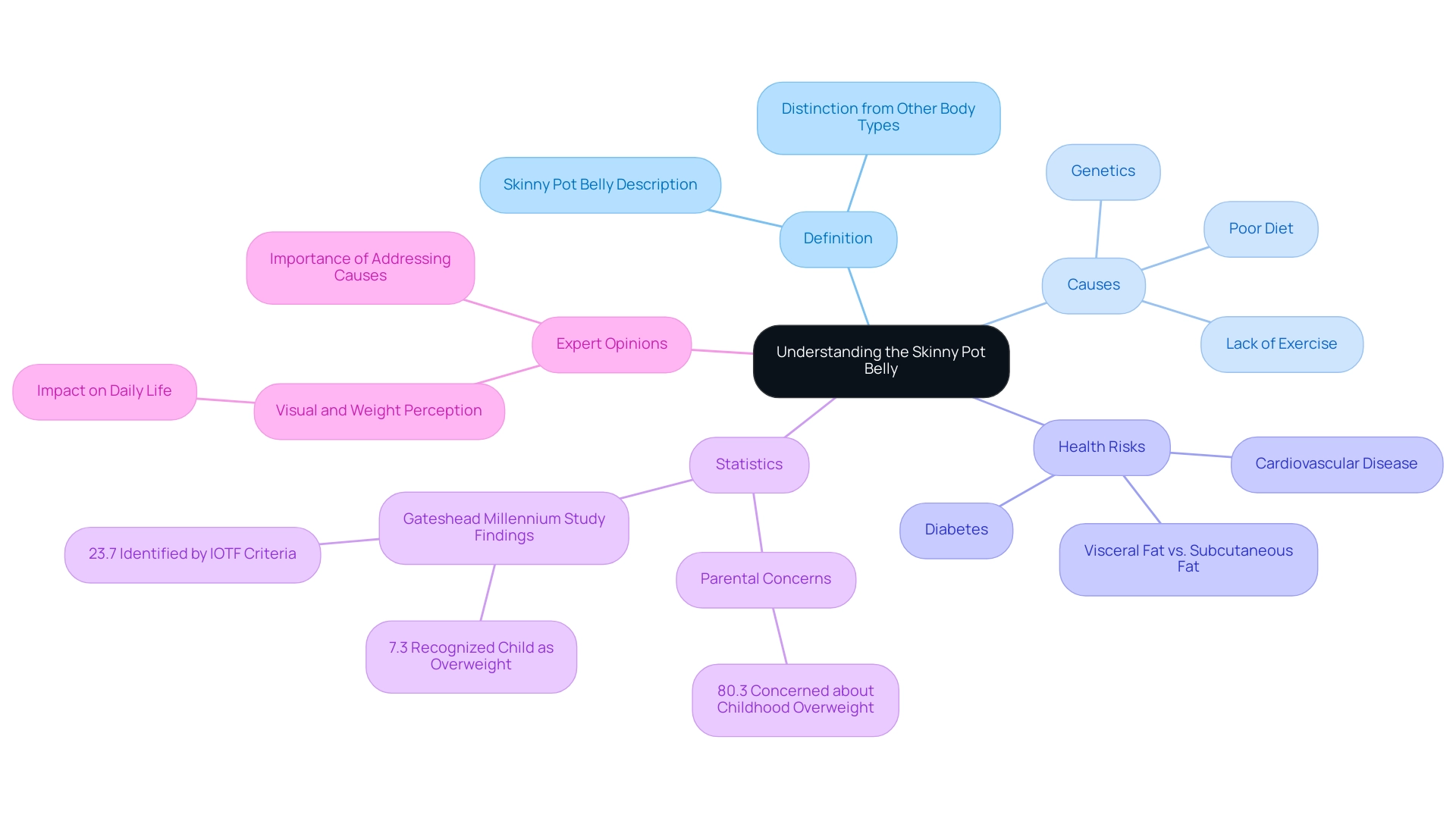
Factors Contributing to the Development of a Pot Belly in Skinny Individuals
The emergence of a pot belly in otherwise slim individuals can be attributed to several interrelated factors:
-
Dietary Choices: A diet high in processed foods, sugars, and unhealthy fats is a significant contributor to abdominal fat accumulation. Research indicates that dietary habits play a crucial role in fat distribution, with certain foods exacerbating the tendency to store fat around the midsection. As noted by George Moschonis from La Trobe University, gaining a better understanding of the behaviors that configure energy balance is essential for developing tailored interventions for tackling obesity and related chronic diseases. Insightful Wellness Coaching provides nutritional advice as part of its extensive wellness coaching services, assisting individuals in making informed dietary decisions to address these concerns.
-
Sedentary Lifestyle: Insufficient physical activity not only leads to muscle loss but also promotes fat storage, particularly in the abdominal region. Current studies highlight that a sedentary lifestyle is a major risk factor for increased abdominal fat, emphasizing the importance of regular exercise in maintaining a healthy body composition. Implementing workplace exercise programs can significantly decrease absenteeism and presenteeism while increasing employee satisfaction and positive emotions, as shown in the case study titled "Benefits of Workplace Exercise Programs." Insightful Coaching offers customized fitness guidance and wellness workshops aimed at engaging employees and encouraging an active lifestyle.
-
Hormonal Imbalances: Hormones, particularly cortisol, can significantly affect fat distribution. Elevated cortisol levels, often linked to stress, can lead to increased belly fat even in individuals who are otherwise lean. Understanding the hormonal influences on body fat can aid in developing targeted interventions. This coaching service addresses these concerns through personalized guidance that includes stress management techniques.
-
Genetics: Genetic predisposition also plays a role in fat storage patterns. Some individuals may be more likely to accumulate fat in their midsection due to inherited traits, regardless of their overall body weight.
Incorporating regular exercise and making mindful dietary choices can mitigate these factors, promoting a healthier body composition and reducing the risk of developing a pot belly. For organizations aiming to tackle these wellness concerns, Foresight Health Coaching's corporate partnership provides a structured method to improve employee well-being. This encompasses in-person wellness discussions, extensive pantry and nutrition services, and access to our wellness app, which supports clients in their wellness journeys.
By addressing these elements through tailored programs, individuals can take proactive steps towards achieving their health and wellness goals. HR Benefits Managers are encouraged to reach out to Coaching to discover more about how we can assist your organization’s wellness initiatives.
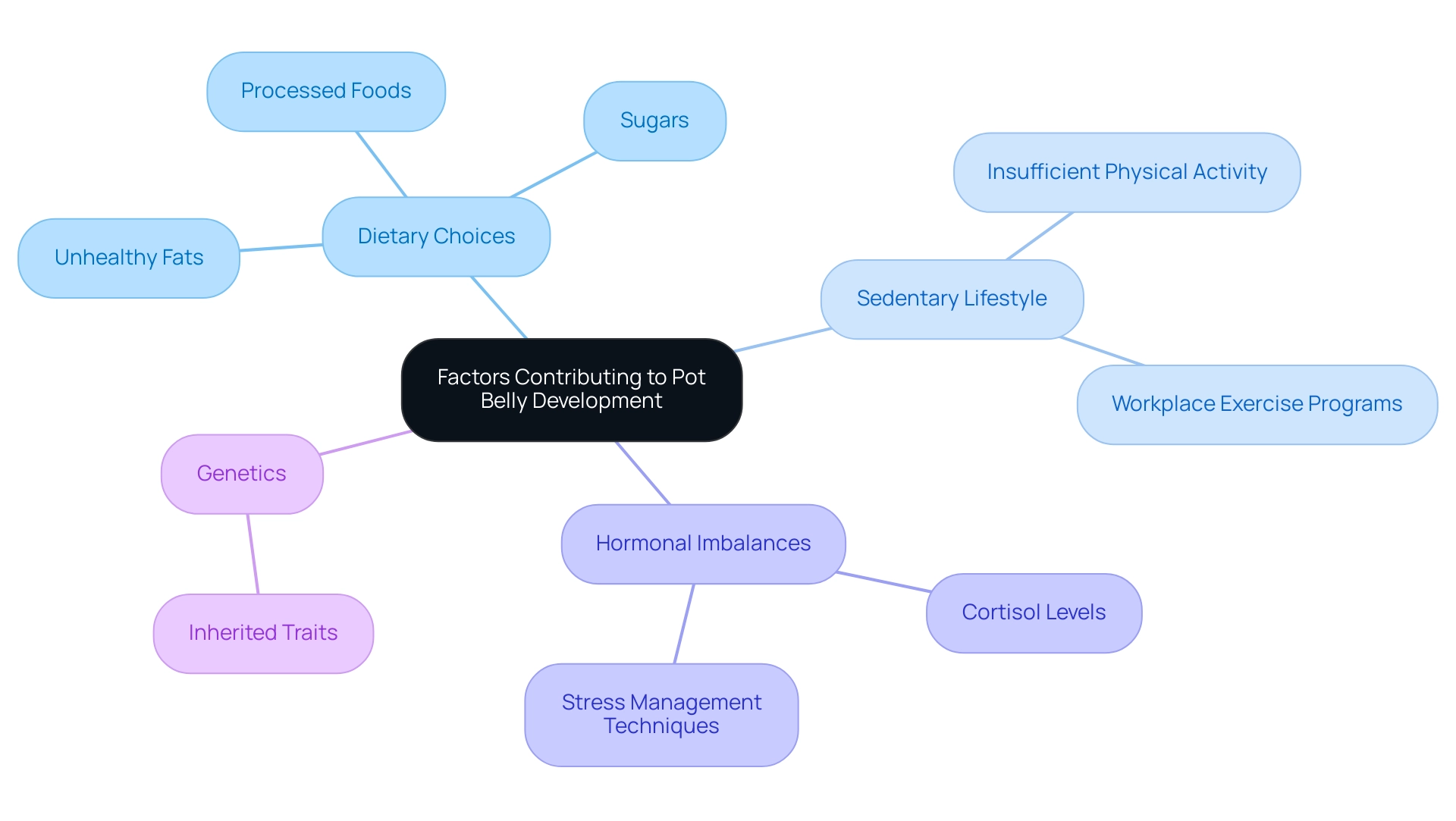
Nutritional Strategies to Combat Pot Belly Fat
To effectively combat pot belly fat, consider implementing the following nutritional strategies, supported by Foresight Health Coaching's comprehensive services:
-
Increase Fiber Intake: Incorporating foods rich in soluble fiber, such as oats, beans, and fruits, can significantly aid in reducing belly fat. These foods promote satiety, helping to regulate digestion and control appetite. Research indicates that a higher fiber intake is associated with lower abdominal fat levels, making it a crucial component of any weight management plan. As noted by nutrition expert Ryan Raman, "One way short-chain fatty acids may help regulate your fat metabolism is by increasing the rate of fat burning or decreasing the rate of fat storage, although exactly how this works is not completely understood."
-
Limit Processed Foods: Reducing the consumption of processed foods and added sugars is essential for preventing excess calorie intake and fat storage. Processed foods often contain unhealthy fats and sugars that contribute to abdominal fat accumulation. By concentrating on whole, unprocessed foods, individuals can better manage their weight and enhance overall well-being. It's important to remember that for every 1 mg/dL reduction in LDL cholesterol, the relative risk of developing coronary heart disease decreases by 1%, highlighting the significance of dietary choices.
-
Focus on Lean Proteins: Incorporating lean proteins such as chicken, fish, and legumes into your diet can support muscle building and boost metabolism. Protein is vital for maintaining muscle mass, especially when losing weight, and can enhance feelings of fullness, further aiding in weight management.
-
Stay Hydrated: Adequate hydration is key to effective digestion and appetite control. Drinking plenty of water can help reduce the likelihood of overeating by promoting a sense of fullness. Additionally, staying hydrated supports overall metabolic processes, which can contribute to fat reduction.
Furthermore, a case study titled "Gastrointestinal Comfort and Acceptability of Fiber Supplements" assessed whether increased fiber intake from supplements influenced gastrointestinal comfort and appetite among participants over an 8-week period. While participants reported mild gastrointestinal discomfort, the overall findings did not lead to significant adverse reactions, indicating that fiber can be beneficial when introduced thoughtfully.
By adopting these nutritional strategies, individuals can take significant steps toward reducing skinny pot belly fat and enhancing their overall well-being. The advantages of fiber, specifically, go beyond weight management; it plays a crucial role in regulating fat metabolism and improving digestive function. As noted by nutrition experts, increasing fiber intake can lead to improved fat burning and reduced fat storage, making it a powerful ally in the quest for a healthier body.
Moreover, the corporate membership offerings from our coaching services, which encompass in-person wellness discussions, pantry services, and access to our well-being app, provide organizations with a chance to cultivate a healthier and more resilient team atmosphere, aligning with these nutritional strategies. For more detailed guidance on implementing these strategies, refer to our user manuals and FAQs.
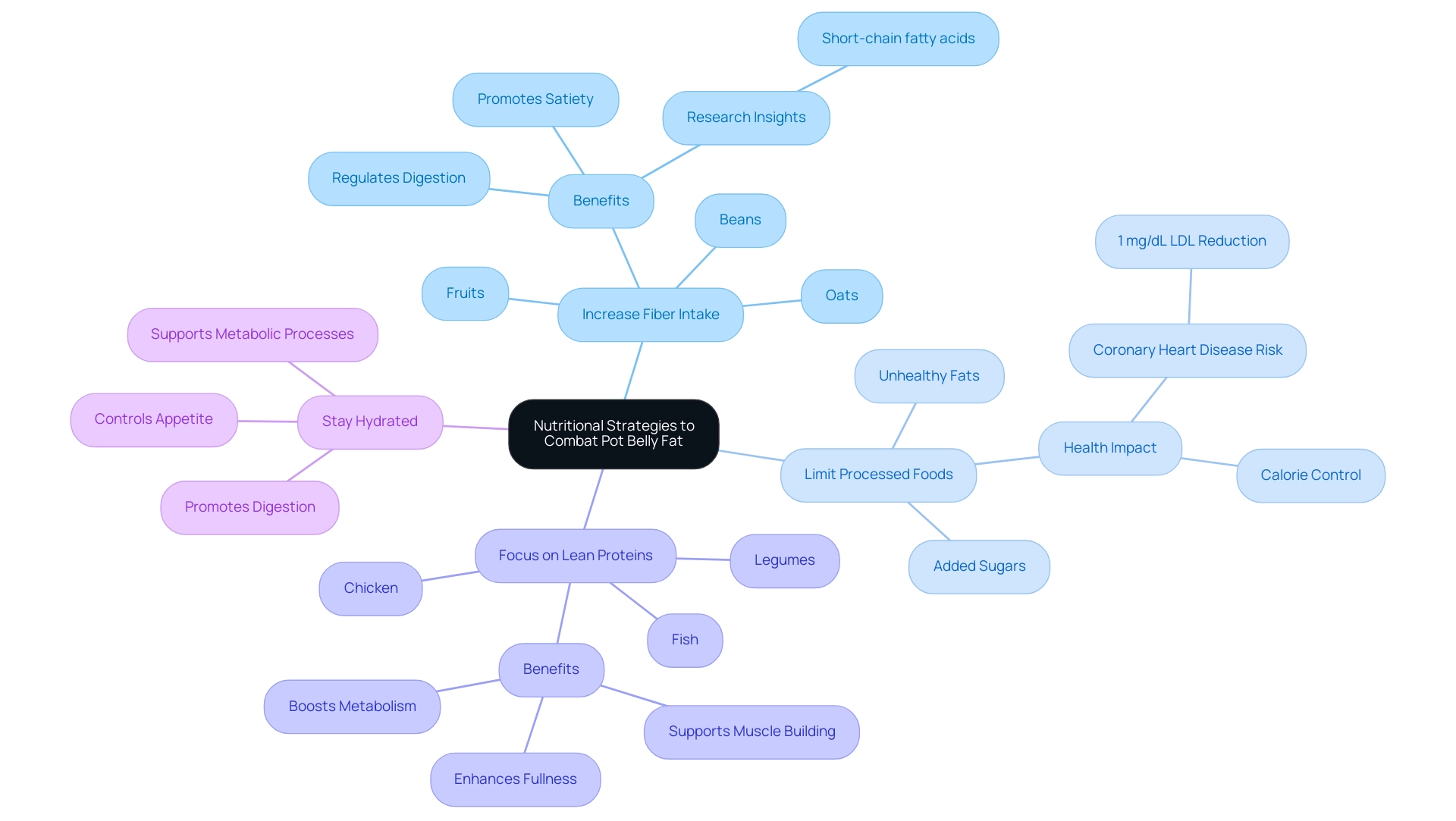
Effective Exercise Regimens for Reducing Belly Fat
To effectively reduce belly fat, consider incorporating the following exercise regimens into your routine, supported by the comprehensive health coaching services offered by Foresight Health Coaching:
- Aerobic Exercise: Aim for at least 150 minutes of moderate-intensity aerobic activity each week. Activities such as brisk walking, cycling, or swimming not only enhance cardiovascular health but also significantly contribute to fat loss. Research indicates that participants in aerobic programs experienced an average daily energy intake decrease of 18% over 12 weeks, underscoring the effectiveness of consistent aerobic engagement in managing body composition. Wellness Coaching can assist in creating a customized aerobic plan suited to your requirements.
- Strength Training: Integrate strength training exercises at least twice a week. Building muscle mass is crucial as it can elevate your resting metabolic rate, promoting fat loss. A systematic review demonstrated that resistance-based exercise programs effectively reduce body fat percentage and whole-body fat mass, particularly when combined with caloric restriction. This dual approach is essential for sustainable weight management while preserving lean muscle. As noted by Pedro Lopez, "Statistical analysis shows that resistance training is a key component in effective fat loss strategies." The organization provides customized strength training programs that can be accessed via our app for enduring lifestyle changes.
- Core Workouts: Focus on exercises that strengthen the core, such as planks, crunches, and leg raises. These workouts not only tone abdominal muscles but also improve posture and stability, which are vital for overall fitness. Our wellness workshops can provide guidance on effective core training techniques.
- High-Intensity Interval Training (HIIT): Incorporate HIIT workouts into your routine to maximize calorie burn and enhance cardiovascular fitness in shorter time frames. HIIT has been shown to be particularly effective for reducing abdominal fat, making it a valuable addition to any fat loss strategy aimed at achieving a skinny pot belly. The Coaching service can help in creating a HIIT program that aligns with your schedule and fitness level.
By adopting these exercise regimens, individuals can effectively target belly fat to achieve a skinny pot belly while enhancing overall well-being and fitness. The combination of aerobic and strength training, along with core-focused workouts and HIIT, creates a comprehensive approach to achieving a healthier body composition. Moreover, organizations collaborating with Insight Wellness Coaching can incorporate these strategies into their corporate well-being programs, promoting a culture of wellness and unity within their teams.
For additional guidance on utilizing our services effectively, please refer to our user manuals and FAQs, which provide detailed information on our nutritional guidance and how it complements these exercise regimens.
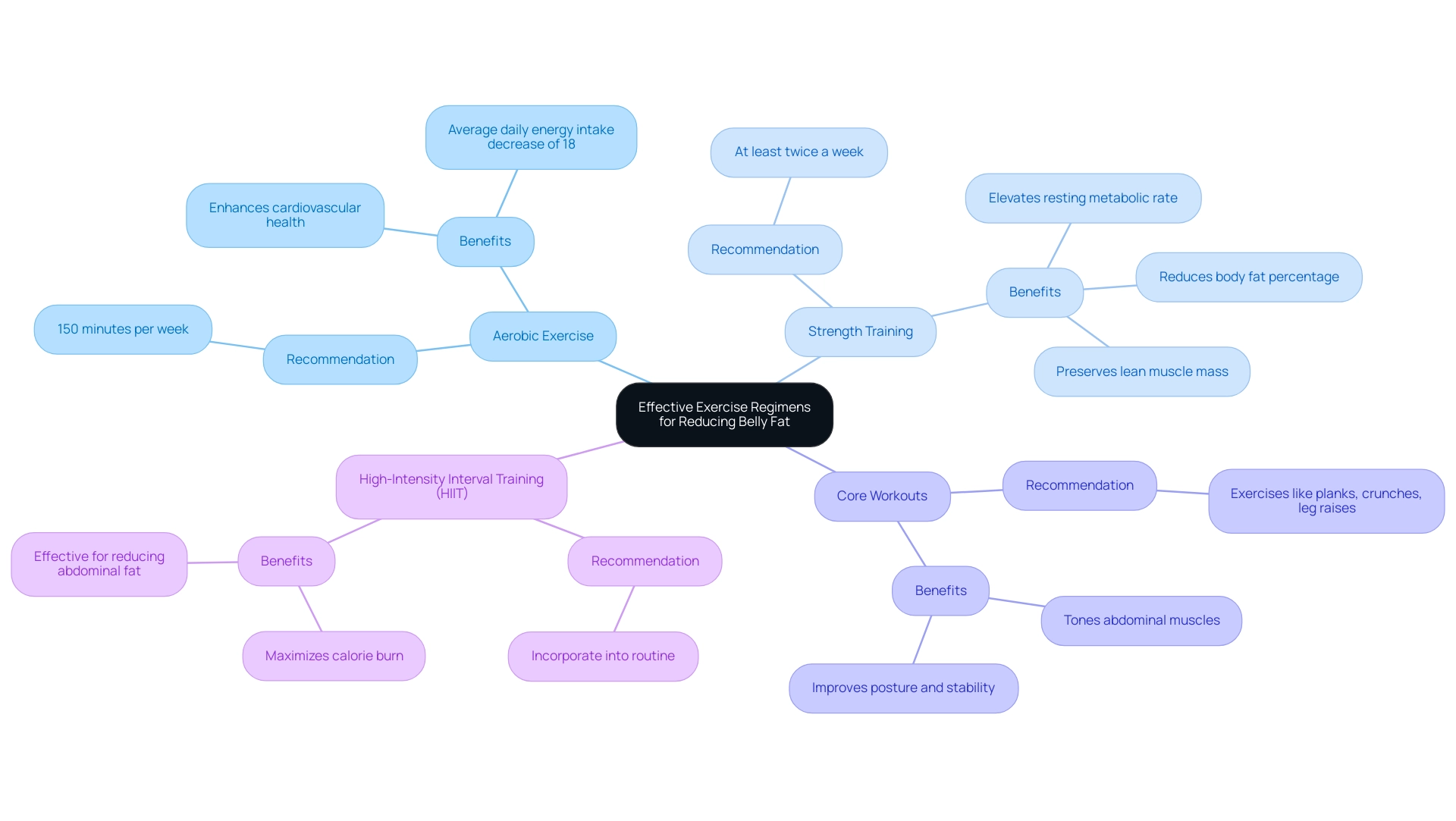
Lifestyle Modifications for a Healthier Body and Reduced Belly Fat
In addition to diet and exercise, consider these impactful lifestyle modifications:
-
Manage Stress: Chronic stress significantly contributes to belly fat accumulation due to elevated cortisol levels. Engaging in stress-reducing activities such as yoga, meditation, or deep-breathing exercises effectively lowers cortisol and mitigates this risk. Dr. Charlie Seltzer, a weight loss physician, notes, "That’s because stress-related weight gain can only be diagnosed by taking a careful history and ruling out other things, like low thyroid function, that can also cause weight gain." Research indicates that individuals who actively manage stress are more successful in maintaining a healthy weight. Foresight Health Coaching offers tailored wellness programs that include stress management workshops, providing employees with the tools they need to thrive.
-
Prioritize Sleep: Quality sleep is crucial for overall well-being and weight management. Aim for 7-9 hours of restorative sleep each night, as inadequate sleep disrupts hormones that regulate appetite and fat storage. Current studies reveal that normal-weight women with excess belly fat face a 32% higher risk of early death compared to their obese counterparts, underscoring the importance of addressing sleep quality to prevent fat accumulation. A case study titled "Good Sleep Hygiene and Stress Management" highlights that prioritizing sleep and implementing strategies to improve sleep quality can enhance overall health and resilience against stress. Wellness Coaching can help organizations encourage improved sleep practices through educational seminars and resources.
-
Stay Active Throughout the Day: Incorporating more movement into your daily routine can significantly impact your waistline. Simple changes, such as taking breaks to walk, opting for stairs instead of elevators, and using a standing desk, can enhance your overall activity level. Regular physical activity not only aids in weight management but also boosts mood and productivity. Insight Fitness Coaching offers exercise guidance customized to personal requirements, motivating employees to remain active and involved.
-
Limit Alcohol Consumption: Reducing alcohol intake is a practical step towards decreasing calorie consumption and preventing fat accumulation around the abdomen. Studies show that excessive alcohol can lead to a skinny pot belly, making moderation essential for those aiming to slim down. Wellness Coaching can assist this initiative by providing nutritional advice that highlights healthy lifestyle options.
By adopting these lifestyle changes, individuals can effectively combat the issue of a skinny pot belly and enhance their overall well-being. Prioritizing stress management and sleep quality, along with maintaining an active lifestyle and moderating alcohol intake, creates a holistic approach to achieving a healthier body and mind. Moreover, organizations can improve these initiatives through collaborations with Wellness Coaching, which provides corporate memberships for as many as 30 employees, including in-person wellness discussions, nutrition services, and access to our wellness app.
This promotes a culture of well-being and unity within their teams, ensuring that employees have the support they need to thrive.
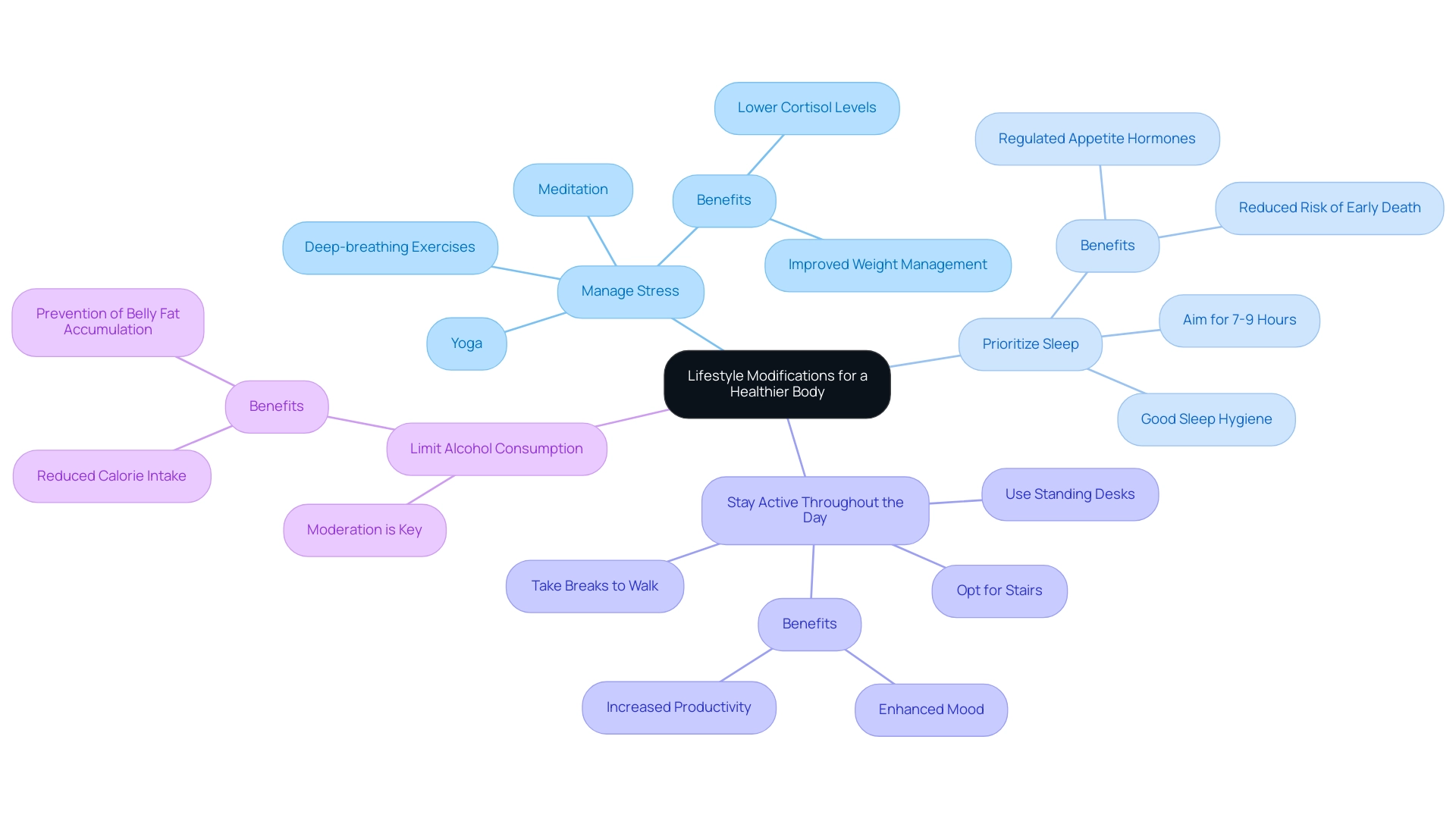
Actionable Steps to Start Reducing Your Skinny Pot Belly Today
To effectively reduce your skinny pot belly, consider adopting the following actionable steps.
- Assess Your Diet: Begin by maintaining a food diary for one week. This practice can help you pinpoint specific areas for improvement in your eating habits.
Research indicates that individuals who utilize food diaries are more likely to enhance their dietary choices, leading to better weight management outcomes. According to myfood24, there are over 92,000 food and drink items with comprehensive nutrient information available, which can aid in understanding the nutrient content of your meals. This wellness coaching offers tailored nutritional advice as part of their extensive coaching services, assisting you in evaluating your food consumption and making knowledgeable decisions.
However, further research is needed to explore the impact of diary preference on weight management outcomes, as highlighted in a study that showed participants using their preferred diary method had higher adherence to recording food and exercise.
- Set Realistic Goals: Establish achievable fitness and nutrition goals. Setting realistic targets is crucial for maintaining motivation and tracking your progress.
Studies show that individuals who set specific, measurable goals are more likely to succeed in their fitness and nutrition endeavors. The customized coaching programs can assist you in setting and achieving these goals, ensuring they align with your personal health journey.
- Create a Workout Schedule: Design a weekly workout plan that includes a balanced mix of cardio, strength training, and core exercises.
This variety not only helps in reducing belly fat but also promotes overall fitness. Regular physical activity has been linked to improved job performance and cognitive function, making it a vital component of your routine. Health Coaching offers personalized fitness guidance and tailored program creation through their app, enabling you to design a schedule that aligns with your lifestyle and objectives.
- Practice Mindfulness: Incorporate mindfulness techniques into your daily life. Mindfulness can help manage stress and improve your relationship with food, which is essential for effective weight management. Engaging in mindful eating practices can lead to better food choices and reduced emotional eating.
The organization's wellness workshops often include mindfulness training, equipping you with tools to enhance your mental well-being.
- Stay Consistent: Commit to integrating these changes into your daily routine. Consistency is key to achieving lasting results.
Research indicates that individuals who stick to their fitness and nutrition plans over time achieve greater success in reducing body fat and enhancing overall well-being. With Foresight's ongoing support through their wellness app, you can stay connected and motivated on your journey.
By following these steps and leveraging the comprehensive coaching services offered by Foresight, including corporate memberships that cover up to 30 employees with in-person wellness talks and nutrition services, you can make significant strides toward enhancing your overall well-being and reducing your skinny pot belly. Remember, the journey to improved well-being is a marathon, not a sprint, and setting realistic expectations will help you stay on track. As Junkang Zhao noted, while dietary pattern research is gaining attention, it should coexist with single-nutrient research to provide a comprehensive understanding of nutrition.
Additionally, future clinical investigations are needed to explore the impact of meal timing on health, emphasizing the importance of efficient dietary assessment methods. For more information on how to implement these services in your organization, contact Foresight Health Coaching today.
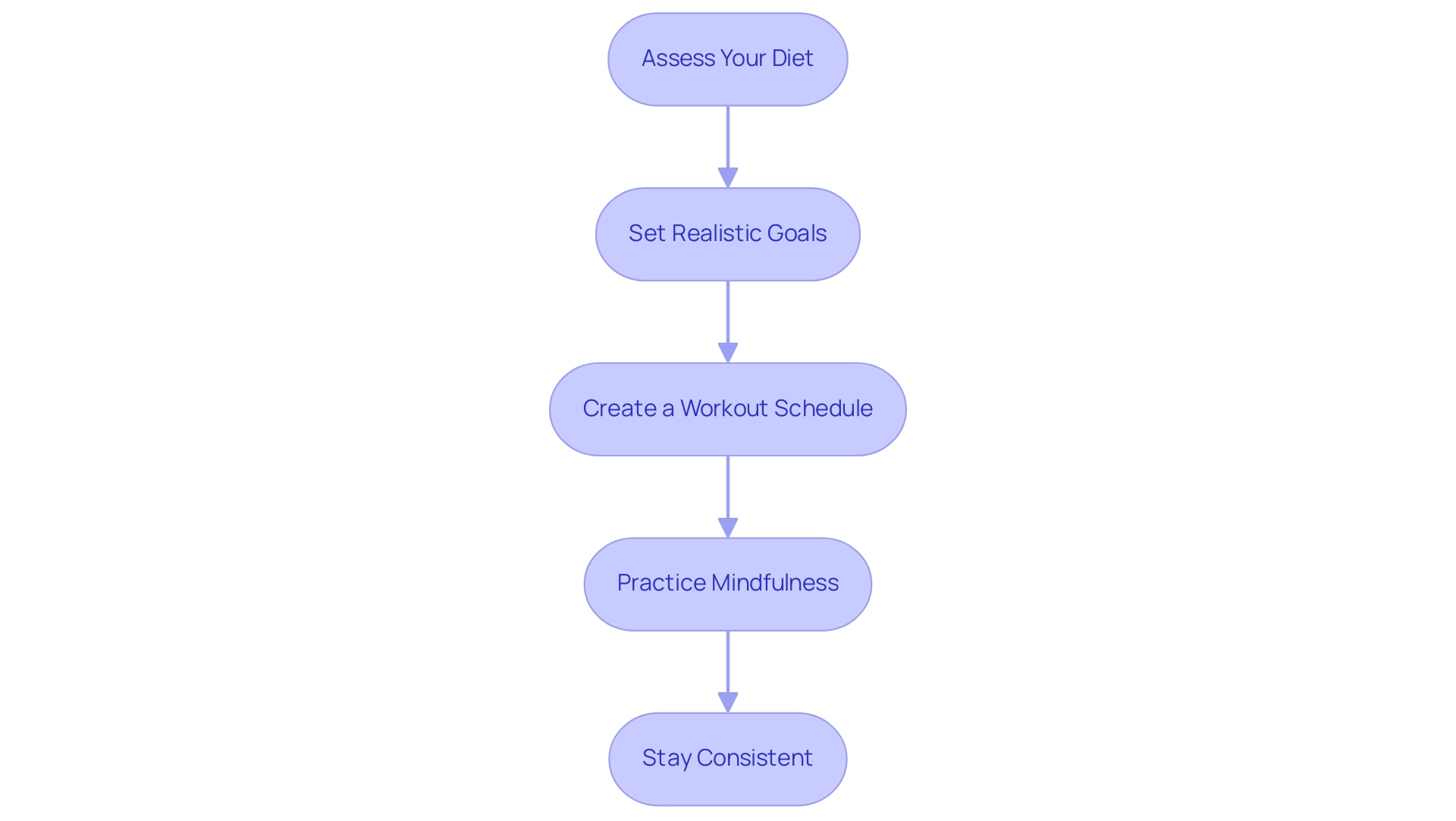
Conclusion
Understanding the complexities surrounding a skinny pot belly is crucial in addressing health risks associated with excess visceral fat. This condition, often overlooked due to the misleading appearance of overall thinness, can stem from various factors, including:
- Poor dietary choices
- Sedentary lifestyles
- Hormonal imbalances
- Genetic predispositions
Recognizing that even slim individuals can carry harmful visceral fat highlights the importance of proactive health measures and a comprehensive understanding of body composition.
To combat the challenges posed by a skinny pot belly, individuals can adopt effective nutritional strategies, engage in regular exercise, and implement lifestyle modifications. Essential dietary steps include:
- Increasing fiber intake
- Limiting processed foods
- Focusing on lean proteins
- Staying hydrated
Complementing these with aerobic and strength training exercises, along with core workouts, can significantly enhance overall health and body composition. Furthermore, vital lifestyle adjustments include:
- Managing stress
- Prioritizing quality sleep
- Staying active throughout the day
- Moderating alcohol consumption
Ultimately, the journey towards achieving a healthier body and mitigating the risks associated with a skinny pot belly requires a multifaceted approach. By embracing these actionable steps and seeking support from health coaching services, individuals can make informed choices that lead to lasting changes. This ongoing commitment to health not only fosters personal well-being but also cultivates a supportive environment for others, encouraging a collective pursuit of better health and fitness.




